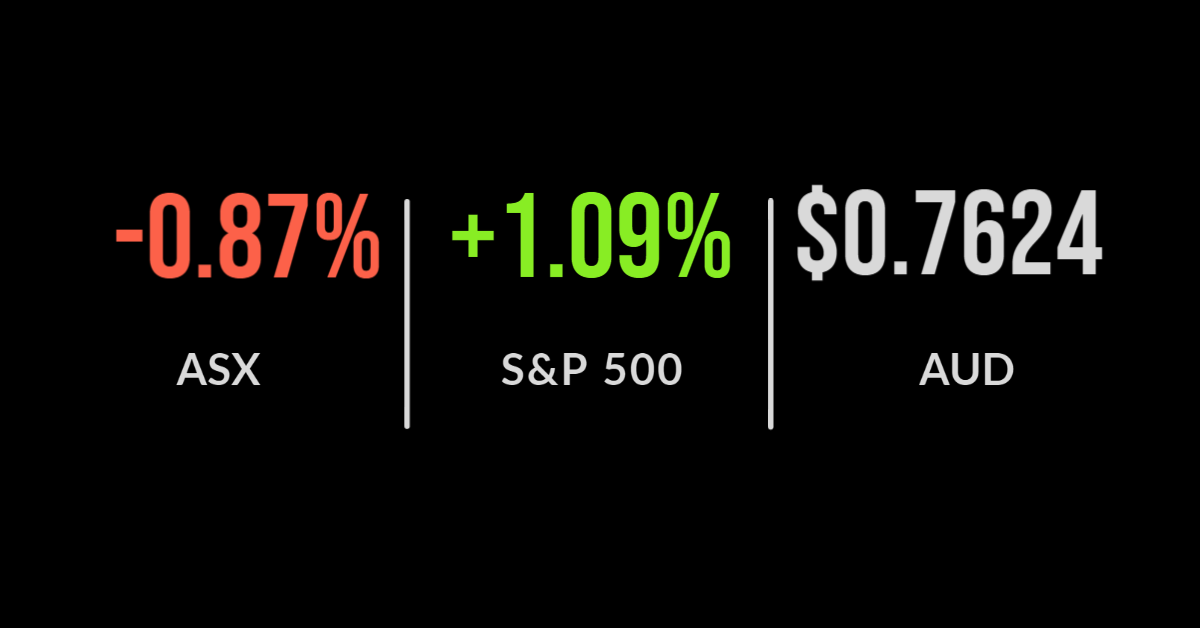ASX down on Victorian outbreak
ASX down on Victorian outbreak, Origin (ASX:ORG) and AGL Energy (ASX:AGL) downgrade, record trade surplus
The ASX200 (ASX:XJO) broke its three day run, falling 0.9% due to a combination of weaker global markets and an unexpected outbreak from hotel quarantine in Victoria.
Every sector finished lower, but property (-2.4%) utilities (-2.0%) and energy (-1.2%) were among the hardest hit as Australia reported a record $73 billion trade surplus for 2020.
The Australian ten-year government bond yield reached 1.2% during the day, despite the RBA’s efforts to push the rate lower.
This is the benchmark across which all asset prices are compared, hence an increase in yield sent listed property and long-term bond values lower.
These increases take significantly longer to flow into residential property lending, hence the likelihood that the sector remains hot in the coming months.
Furniture retailer Nick Scali (ASX:NCK) reported a 99.5% increase in net profit for the first half of FY21 on the back of a 24.4% increase in revenue.
Despite facing increasing pressure on imported product, the company has performed incredibly well and managed to increase its profit margin to 64% in the first half.
Cash flow tripled to $53.5 million and the dividend was increased to 40 cents per share. Management have faced political pressure to return Job Keeper payments given the performance, but as yet have made no such decision; shares fell 0.9%.
Expectations reset at Origin Energy (ASX:ORG) and AGL Energy (ASX:AGL), Alliance (ASX:AQZ) makes a deal
It was a tough day for Australia’s major energy suppliers, with both AGL and ORG either writing down the value of their generation assets or flagging lower earnings on the back of weaker demand and lower electricity prices.
Starting with AGL, the company announced a further $2.67 billion in write-downs, but no change to their underlying or true net profit, which will fall between $500 and $580 million.
The reason for the write-down was twofold, the first so-called ‘onerous’ contracts to support wind farm operations in the early 2010’s, with agreed purchase prices significantly higher than the price at which the energy can be sold.
The group has also been forced to reduce the discount rate on their Environmental Restoration Program, through which they set aside funds each year.
Lower bond rates mean the discount rate has reduced from 10% to 3%, meaning the company needs to allocate three times more capital to these expenses in the future.
This is a non-cash impact, and given recent movements in bond rates, may be reversed in the coming years; shares finished 3.6% lower.
ORG downgraded earnings, blaming milder summer conditions, lower energy demand and electricity prices. Management guided to a 13% reduction in the bottom end of their earnings range, from $1.15 to $1.30 billion to $1.00 to $1.14 billion, but highlighted $100 million in corporate cost savings.
Both AP LNG and Natural Gas profits are expected to fall, with the former now unlikely to make a distribution in 2021; shares finished 6.9% lower.
S&P500 record close, unemployment slows, Paypal (NASDAQ:PYPL) delivers strongest year ever
US markets continued their strong recent run, with the S&P500 adding 1.1% to finish at another record; the Nasdaq also gained 1.2% as the market moves on from the short selling shock.
The US is facing a similar trend as Australia, with both the USD and Government bond yield heading higher, putting a potential headwind on valuations.
Digital payments provider PayPal (NASDAQ:PYPL) offered further evidence of its incredible power, reported its strongest year ever after revenue increased 23% during the final quarter of 2020.
The company is seeing incredible growth after those who we forced to shop online during the pandemic decide to keep doing so.
Quarterly profit tripled to $US1.57 billion on US$6.10 billion in revenue, with management reporting record new customers, volumes, revenue, earnings and free cash flow.
They are now forecasting another 20% growth in revenue in 2021 and are pushing forward with their acceptance of cryptocurrency payments; shares finished 7.4% higher on the report of an all-time high.
Digital music streaming and podcast service Spotify (NASDAQ:SPOT) reported a 27% increase in active users to 155 million, with premium subscribers growing by 11 million in the quarter. Revenue increased 27% but cash flow fell 56% as they continue to invest in additional content; shares were flat.







